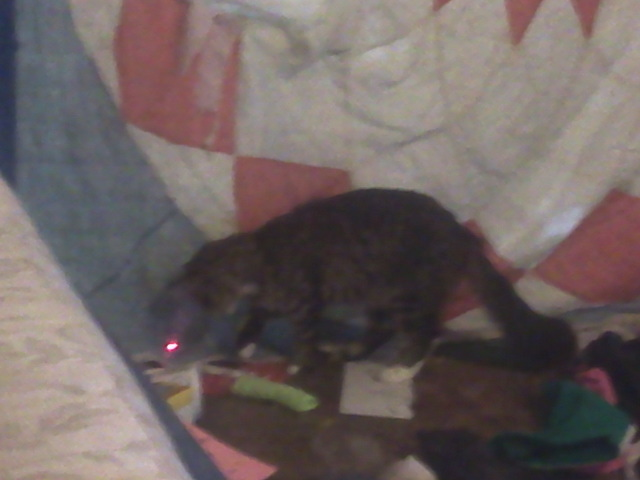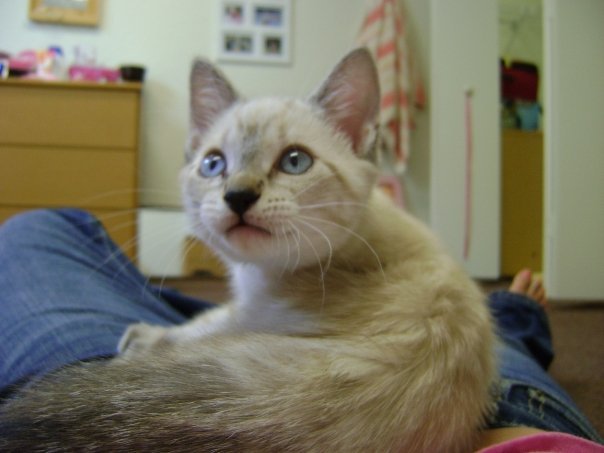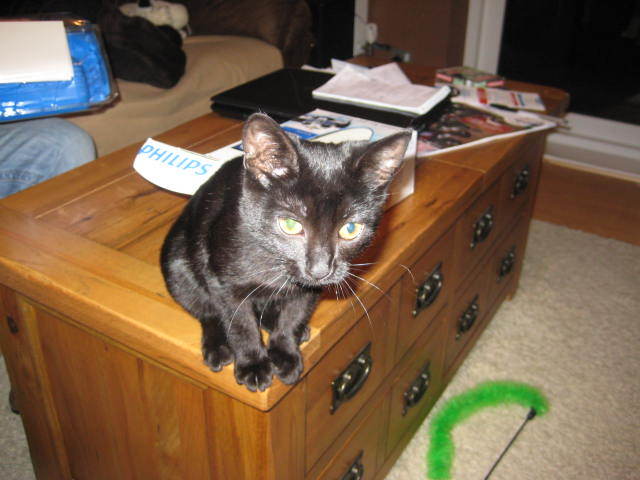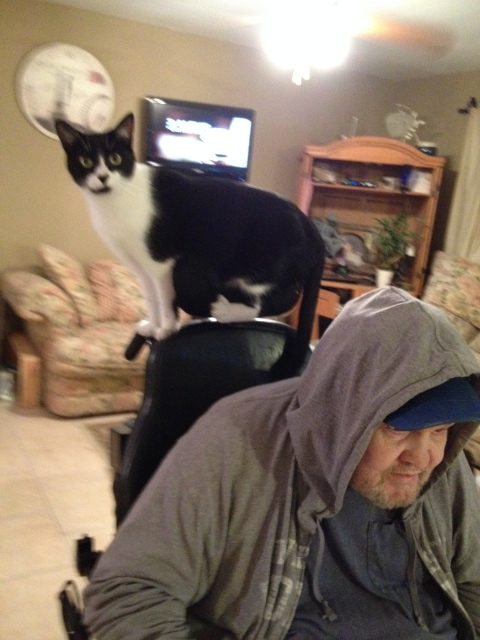QuestionI have a large but not heavy stray black male double claw cat fairly old that comes to my house every day for food (believe he lives with bad owners nearby). We have a fixed female that has no love for this stray but they do not fight. The stray has scars and scratches, bumps and shaggy/torn hair all over it. It can eat all day but is fairly skinny. About 8 months ago the hair with attached skin peeled off its sides and now it is doing that again. It is very protective of itself but will let us pat it, only on the head, and keeps us company outside at times. Both due to a lack of money and the inability to get it into a carrier will not allow us to take it to a vet. Do you think it has some form of worm infection or a auto-immune problems and what should we do?
Larry - "hates to see a cat suffering"
AnswerLarry,
I do apologize, it seems that you've misunderstood the scope of my expertise. Unfortunately I am not a licensed vet. I generally make sure that I tell all pet parents who ask any medical questions of me that I am not able (or allowed to, by law) to make any kind of medical diagnosis, prescribe medical treatments or give you any kind of prognosis, in this case I neglected to mention this as a preface to my original answer. If you did want a medical opinion there is a fantastic holistic vet who volunteers her time on the Ask A Vet portion of this website, her name is Dr. Christine Chambreau and anytime that I've referred pet parents to her she's been wonderful at helping them to the best of her ability online. I'm not entirely sure if Dr. Chambreau still does this, but to my knowledge she is willing to provide consultations online or by telephone throughout the US for a fee ~ you'd have to discuss actual costs with her since I've never needed online or telephone consults with her, so I have absolutely no idea how much she charges. When it comes to caring for my own cats I prefer to seek the advice of our family vet who is familiar with their medical and behavioural history. Overall although it took us a long time to find a vet we were completely comfortable with we're really pleased to have found a fantastic holistic practitioner who prefers to keep any treatments she recommends as non-invasive and natural as possible. We really like the fact that our family's feline physician is also trained and experienced in the use of homeopathy to treat a variety of medical and behavioural issues when my cats are in need of medical care.
Any information that I provide when pet parents contact me about any kind of medical issues is simply based on my own experience ~ my experience with hair loss and my own cats is fairly limited and my foster kitties with skin conditions have usually been diagnosed and are generally in the process of being treated when I become their caregiver, they simply need some time to heal and grow their hair back so that they're more appealing and stand a better chance of getting a second chance with a forever family. As a volunteer on this site I do my absolute best to help a large number of pet parents who contact me about a variety of issues that their kitty may be experiencing at any given point and I'm happy to help wherever possible. Unfortunately since I'm not a veterinarian ~ skin conditions and hair loss have a wide variety of causes that can range from allergies to food and substances within the cat's environment to over/under-active thyroid or auto-immune issues. This means that my ability to help beyond recommending a full assessment including a thorough physical exam and a variety of diagnostic tests performed by a licensed veterinarian is very limited.
I do believe that this is a case where you and your kitty would probably be better served by seeking out the advice of a holistic veterinarian simply because holistic vets tend to have more tools at their disposal since they've opted to further their education by receiving training in "alternative" therapies such as homeopathy, veterinary chiropractic care, Reiki, massage, acupuncture and herbal medicine. As far as holistic or alternative therapies go the list doesn't stop ~ I've simply mentioned a few approaches that are most commonly considered by pet parents. Alternative therapies are widely varied in terms of how long they've been around, where they originated, their intended uses and how effective they are at treating a variety of medical and behavioural issues. Ultimately I prefer holistic care because the practitioners tend to be more focused on keeping things as natural and gentle as possible while accomplishing a great end result in the most non-invasive way possible.
Holistic care is essentially about finding the best possible way to treat a person or pet's issues by addressing the root cause (infinitely more challenging in pets since they're not able to talk with the practitioner caring for them) and gently guiding the patient back to a natural state of balance which results in the problem behaviours or medical issues slowly disappearing. For many of the holistic approaches veterinarians (and even human doctors) who practice conventional medicine only tend to be skeptical because there's no easy scientific formula for determing why or how a specific treatment contributes to the recovery of the patient, but in my personal experience the gentler, more balanced approach of holistic medicine treats the underlying cause of a medical or behavioural issue rather than simply suppressing the symptoms being manifested at a specific time.
I must reiterate that the causes of serious hair loss like this kitty's currently experiencing could be caused by a wide variety of medical, behavioural or nutritional issues ranging from an allergy to external parasites, food/environmental allergies, poor quality diet, nutrition that's not species appropriate. In all honesty there really isn't any way for a layperson like myself or even a veterinarian to formulate a diagnosis without ever seeing the kitty. Some vets will want to run a variety of diagnostic tests to determine what's going on with this little guy, others will take the approach of diagnosis by the process of elimination which ultimately means that they will treat your kitty for conditions (starting with the most common, working towards the most uncommon) until they've ruled out all but one condition which can be expensive, heartbreaking and very difficult to watch.
Allergies are becoming increasingly common in pets, some veterinarians and laypeople believe that this is the result of poor quality diets, the overuse of vaccines and other medications and repeated exposure to chemicals like pesticides and household cleaners. Unlike us cats don't tend to develop hayfever like symptoms in response to allergies...They get extremely itchy and it can take several weeks to a couple of months of treatment and removing the allergen from the cat's environment for the symptoms to go away. Obviously this is a situation that should be monitored by a vet to ensure that the cats are receiving the correct doses of homeopathic remedies or medications (whichever is deemed necessary by a holistic vet) to ensure that the right course of treatment has been chosen, the right allergen was removed from the environment and of course to ensure that the kitty is recovering properly.
Since this kitty is an outdoor informally adopted stray there's a possibility that he's contracted viral infections like feline leukemia or FIV (stands for Feline Immunodeficiency Virus), both of which are similar to HIV/AIDS in people ~ don't worry though, these infections are often passed from cat to cat during fights or from queen to kitten during the pregancy or birth but we can't contract these viral infections. If feline leukemia or FIV are the root cause of your kitty's hair loss there's a good chance that his immune system is unable to fight off the smallest of infections and his hair loss might be the result of some serious infections in his skin or somewhere else in his body. In the event that this kitty does have FIV or feline leukemia it would probably be kindest to humanely euthanize him ~ many cats live their entire lives with FIV/feline leukemia and they never show any sign of having these infections, however when a kitty is very sick as a result of these infections it's not likely that he'll be able to live a long, healthy problem free life and depending on your personal beliefs it may be kindest to let him go on a good day rather than subject him to invasive medical procedures, high doses of drugs with nasty side effects and continuous visits to the vet, especially since he's not entirely comfortable with being handled by you (and I would expect other people, including vet staff).
Another potentially devastating reason for hair loss could be that this kitty was born with or developed an auto-immune condition at some point before his first bout of hair loss. Auto-immune conditions are potentially devastating and many carry a poor prognosis over the long term. In the event that your kitty is diagnosed with an auto-immune condition you'll have some difficult decisions to make ~ he may need to be humanely euthanized if you're unable to provide him with the specialized care and a safe, indoor environment that he needs. If you're able financially and emotionally to help make this kitty's life as comfortable and happy as possible for the time that he's got left (again if he's got an auto-immune condition) then you may want to seriously consider adopting him and making him an indoor family member which would be in his best interests.
Your kitty might also have mange, mange mites normally live on the skin of healthy cats/dogs without ever causing any problems, however in pets who do experience the itching and hair loss as a result of these pesky mites need to be treated by a vet. There is a chance that if mange mites are to blame (this is usually more common in dogs than cats, but it happens from time to time) your kitty will need to receive special baths with shampoos designed to kill the mites and alleviate the itching. Sadly there is a mortality rate with pets who develop symptoms like fur loss and itchy skin (sometimes ending up to be oozing, swollen, infected, itchy, red and angry looking). There is a possibility that mange might be an indicator of problems with the kitty's immune system which again comes down to an issue quality of life over quantity of life ~ there are some difficult decisions to make if this is the issue.
It's important to understand the unique nutritional needs of our feline companions in order for us to understand the reason why the bulk of commercially produced pet foods, including those recommended by veterinarians quite often fall into the category of providing nutrition that's not species appropriate. If you'd like to learn more about a cat's unique nutritional needs I'd recommend that you consider checking out the following websites:
~ www.catinfo.org
This site was created by a veterinarian in an attempt to help educate pet parents about the unique nutritional needs of their feline companion. Our family vet directed us to this site when we asked her about making our cats a properly balanced, high quality diet at home (most conventional vets will strongly discourage you from even considering this option, there are some vets who will go so far as to say that you're risking your cat's life by feeding homemade diets, but in reality provided that you use a properly formulated diet and your kitty isn't sick with any kind of condition that could decrease his ability to deal with bacteria there's no reason why you shouldn't try this out...Our three resident cats eat a homemade raw diet similar to the one you'll find on this site and they've never been healthier). This vet presents her information in a simple, down to earth way and provides extensive information about the nutritional needs of cats. Loads of information, but well worth the read.
~ www.catnutrition.org
Another website with extensive information about feline nutrition. This site is referred to on catinfo.org and has a great recipe that has a slightly higher yield of servings than the one on the previous site. This is the recipe that I use, but I add additional supplements including brewer's yeast, some vitamins/minerals and digestive enzymes.
~ www.felinespride.com
This website is very informative. Feline's Pride makes a high quality raw diet similar in composition to the diets on the previous two websites, but they will deliver it frozen via courier within the US and they guarantee that their food will arrive still mostly frozen provided that you are there to sign for the package and you unpack and store the food in the freezer immediately.
~ http://www.halopets.com/pet-education/pet-articles/pet_food_what_you_need_to_kno...
I've seen this article on a variety of websites. I think that all pet parents should read this article before deciding what they'd like to feed their cats because the ingredients that find their way into your pet's bowl just might shock you. Contrary to public belief which has been influenced by creative advertising on the part of the pet food industry itself all pet foods are not created equal. In fact I believe that if most people knew what ended up in pet foods, including "vet recommended", premium/super premium and prescription diets the pet food industry wouldn't be nearly as profitable as it is today.
While many pet parents believe that veterinarians receive extensive training about the nutritional needs of our pets and how best to meet those needs the reality is quite different ~ vets receive some fairly general information about nutrition while they're in school, the remainder of their information comes from the pet food industry itself. This is the only industry that I'm aware of that's self regulating and able to pay vets a stipend or provide their clinic with pet food free of charge or for a nominal fee (the food is meant to be sold to pet parents for a tidy profit)...Unfortunately pets are the ones who suffer as a result of this scary practice ~ both the pet food industry and the veterinarians walk away with a profit, our pets are the pawns in a game that's all about making money.
The pet food industry profits because people trust their vets and believe that these practitioners are only concerned with providing the best possible advice to ensure the long term health and wellbeing of our pets when in reality low quality foods are being sold for a ridiculously high price simply because they've been labelled as premium or vet recommended. Vets profit because poor nutrition means that pets are more likely to get sick ~ the saying "garbage in, garbage out" applies just as much to our pets as it does to us. After all if we ate highly processed, nutritionally inadequate convenience foods all day every day we wouldn't be very healthy, the same is true for our pets.
With all of the information provided above I sincerely hope that you've learned a bit more about just how complex skin conditions can be, how difficult it is for a licensed vet to diagnose the issues and how complex the courses of treatment can become. I did promise you that I would provide you with the names of some organizations that might be willing to help you with the costs associated with having this kitty assessed by a vet, diagnostic tests (if necessary) and prescribing medications or other treatments as the licensed conventional or holistic veterinarian sees fit.
~ You could decide to surrender this kitty to a no kill shelter or sanctuary locally, these organizations sometimes cap expenses per pet and if they can't afford treatment they may decide to humanely euthanize the cat. A sanctuary such as Best Friends located in Utah might be willing to take this kitty on ~ expenses aren't an issue and this little guy will get the best possible care whether he lives out his life at the sanctuary or in a loving home as a special needs adoption. You can contact this organization online at http://www.bestfriends.org/ they may be able to arrange transportation to the sanctuary without cost to you and you can be assured that this kitty will receive the best possible care even if he's not able to be adopted into a forever home.
~ Ask your vet if s/he would be willing to arrange a payment plan with you, some will, some vets won't, but you'll never know unless you ask.
~ Contact your local shelter, sometimes the shelters offer low/no cost veterinary care to people on limited incomes.
~ The Humane Society of the United States (more commonly known as HSUS) may be able to offer some financial assistance with veterinary care if you are elderly, disabled or ill.
~ Check with local veterinary schools, they may be able to offer subsidized care and often their fees are much lower than they are at private vet clinics. Check out the American Veterinary Medical Association's (AVMA) website for the locations of teaching hospitals in your area.
~ If you've got a credit card try asking the company for a higher limit, they may be able to help you out.
~ Call the bank that you deal with, they might be able to give you a small loan to help with the costs of this kitty's medical care.
~ Care Credit offers credit for expenses related to veterinary care, you can contact them at carecredit.com.
~ Help-A-Pet is a charity, their web address is www.help-a-pet.org
~ The Pet Fund, www.thepetfund.com
~ United Animal Nations LifeLine fund, www.uan.org
~ Angels for Animals, www.angels4animals.org
~ Feline Veterinary Emergency Assistance Program, www.fveap.org
~ Feline Outreach, www.felineoutreach.org
~ Cats in Crisis, www.catsincrisis.org
~ Alliance for Animals Metro Action Clinic, http://www.afaboston.org/clinic.htm
~ Massachusettes SPCA, www.mspca.org/site/PageServer?pagename=AAMC_Boston_Financial_Assistance
~ Angell Memorial Animal Hospital - Boston
350 South Huntington Ave.
Boston, MA 02130
617-522-7282
~ Angell Memorial Animal Hospital - Nantucket
21 Crooked Lane
Nantucket, MA 02554
508-228-1491
~ Angell Animal Medical Center - Western New England
171 Union St.
Springfield, MA 01105
413-785-1221
~ The Sampson Fund
PO Box 1756
Orleans, MA 02653
www.sampsonfund.org
* This fund is to benefit companion animals of Cape Cod and adjacent islands of Nantucket and Martha's Vineyard
I do apologize for the fact that although this answer contains a great deal of information I'm not able to diagnose or prescribe treatments, I'm not a licensed vet and even a licensed vet wouldn't make a diagnosis without seeing the kitty and conducting a thorough exam as well as any tests necessary to narrow down the list of possibilities. Although I wish that I could offer more help I really can't. I'd like to reiterate that if you want medical advice it's best to go to the Ask A Vet portion of this site as there are vets that might be able to provide you with more information that is simply outside of the scope of my experience and education.
Although I can't guarantee that any of these organizations will be able to provide low or no cost veterinary care for this kitty I truly hope that they will be able to offer some type of assistance for this kitty. I understand that this kitty isn't very trusting when it comes to being handled by people, it's probably easiest for him if you borrow a humane live trap from your local shelter, bait it with his favorite treat, set it and gently encourage him to go inside. If he's not comfortable with the trap being open and uncovered you can use a large towel or a small blanket to cover the trap which will give it a cave like appearance and your kitty might be more comfortable going inside. I really hope that this kitty's issues are sorted out and that he's healthy again soon ~ beyond the information that I offered here, the recommendations that I've made and the resources I've sent your way I can't do much more for this kitty beyond keeping him in my thoughts and prayers. I would really appreciate an update on his condition and I'm also interested to find out what the diagnosis actually is and how well he does with his treatments so please feel free to keep in touch and send updates my way periodically. If you've got any further cat related questions or concerns please don't hesitate to contact me again, I will do my absolute best to help you and your kitty in any way that I can.

 dones my cat sweet pea look pregnant?
Question
sweet pea sweet pea nipples
Hi w
dones my cat sweet pea look pregnant?
Question
sweet pea sweet pea nipples
Hi w
 One month old Kitten
Question
The one month old, aka
I have tried bef
One month old Kitten
Question
The one month old, aka
I have tried bef
 What kind of cat do i have?
Question
Chula
Ive been trying to figure out wha
What kind of cat do i have?
Question
Chula
Ive been trying to figure out wha
 Cat in Heat with a little blood in her stool
Question
Millie Moo
Hi, I have a 5 month old female kit
Cat in Heat with a little blood in her stool
Question
Millie Moo
Hi, I have a 5 month old female kit
 testosterone replacement for neutered male cat
Question
Monkey riding on dads Monkey sleeping h
testosterone replacement for neutered male cat
Question
Monkey riding on dads Monkey sleeping h